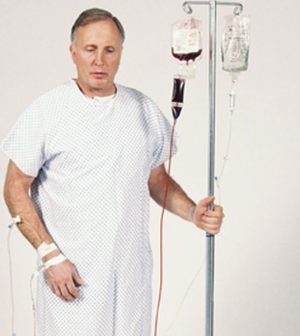- Could Your Grocery Store Meat Be Causing Recurring UTIs?
- Are You Making This Expensive Thermostat Error This Winter?
- Recognizing the Signs of Hypothyroidism
- 10 Strategies to Overcome Insomnia
- Could Artificial Sweeteners Be Aging the Brain Faster?
- Techniques for Soothing Your Nervous System
- Does the Water in Your House Smell Funny? Here’s Why
- Can a Daily Dose of Apple Cider Vinegar Actually Aid Weight Loss?
- 6 Health Beverages That Can Actually Spike Your Blood Sugar
- Treatment Options for Social Anxiety Disorder
The Safer Way to Ease Post-Surgical Pain

For people recovering from surgery or dealing with a painful injury, an expert suggests that there are a number of safer alternatives for managing pain than using potentially addictive opioids.
“Today, more than ever before, we have a host of other methods that can effectively lessen pain,” Dr. James Grant, chair of the department of anesthesiology at Cedars-Sinai in Los Angeles, said in a hospital news release.
The United States is grappling with an opioid addiction epidemic. There were 218,000 overdose deaths involving prescription opioids in 2017, five times higher than in 1999, according to the U.S. Centers for Disease Control and Prevention.
Many people become addicted when they receive prescription opioid medications after surgery or a major injury.
The first step in reducing opioid addiction is making patients realize that managing pain doesn’t mean they are going to be pain-free, according to Grant.
“It’s important for patients to understand that when you undergo surgery, you won’t be entirely pain-free,” he said. “We need to manage expectations and make sure patients understand there likely will be some discomfort associated with any procedure. But as days go by after the procedure, the discomfort should progressively subside a little until you get back to your pre-procedure state.”
Grant also outlined a number of ways to manage pain without opioids.
For many patients, over-the-counter nonsteroidal, anti-inflammatory medications like ibuprofen (Motrin, Advil) or acetaminophen (Tylenol) can be just as effective as opioids, such as oxycodone (OxyContin).
When possible, doctors should consider a peripheral nerve block, which is an injection of a numbing medication near specific nerves that can decrease pain in a particular part of the body during and after surgery, Grant said.
Also, research shows that getting patients out of bed as soon as possible after surgery helps reduce pain and promote faster healing.
And family, friends or other caregivers should be recruited to monitor and manage medication use, communicate with care teams, and help patients stay mentally and physically fit after surgery.
Relaxation techniques such as meditation, reiki and yoga may help with pain, as well as exercise-based therapies customized for each patient and their condition. Other alternatives, like essential oils, massage and physical therapy may also help some patients, according to Grant.
More information
The American Society of Anesthesiologists has more on pain management.
Source: HealthDay
Copyright © 2026 HealthDay. All rights reserved.










